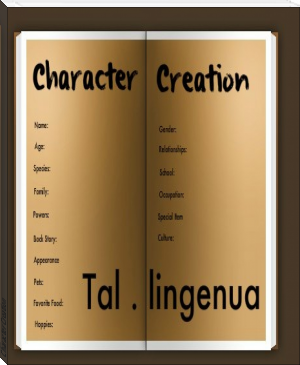Character Creation, Tal Lingenua [reading books for 5 year olds .txt] 📗

- Author: Tal Lingenua
Book online «Character Creation, Tal Lingenua [reading books for 5 year olds .txt] 📗». Author Tal Lingenua
I guess I'll start as close to the beginning as I can: Where do characters come from?
Characters come from all walks of life. They come from our families and friends, commercials (my favorite source), random strangers on the street, photographs on the internet, from ourselves.
I'm not a lawyer but I will say this: you can't just stick real people in your novel without their consent. Something about copyright to their own selves. I'm not too clear on this so just be careful when you use real people. I personally don't use real people (at least not consciously). For more information on this I would look it up and not trust me because I don't really know what I'm talking about.
In using other sources (non-family, non-friend, non-self) I mean you look at these people and imagine how their lives and personalities are. If you overhear bits of pieces of conversation you imagine what would bring that conversation to be.
Here's a couple of things to think about when you see strangers, commercial, photographs etc.
What are they doing? Are they attempting to make their cars do barrel rolls? What sort of people do things like this? (Thriller seekers and risk takers, that's who!)
What are they wearing? I mean seriously, who wears a coat made out of feathers? (Can I get a crazy? Maybe somebody who's making a fashion statement. Someone who wants to be unique. Or maybe they're just plain weird.)
What are they eating, ordering, buying? Maybe they only let their girlfriend order soup (*coughs* tightwad), maybe they're buying damaged goods (that's another tightwad or maybe they're poor).
Where are they? Take notice of their surrounds (where they eat, where they live, where they work etc.)
The list goes on and on and on. Be vigilant of the people around you, take notice of photographs, watch the people in commercials that are not movie trials and promos for TV shows and the such.
A final tip: keep a character library. You never know when you're going to find a character and when you do you may already be swamped with story ideas and have no place for her.
A character library is invaluable. I refer to my character library as the minor leagues. It's the place where characters develop as they await their turn to be called to the show.
Hi again.
The next step in character creation is the absolute basics.
For me, the absolute basics are gender, age, appearance, and name. Now we'll start with gender since that's the easiest one.
Are they male or female or do they have some made up gender or do they have none at all? There's really no special advice to offer you here.
Now on to age. First, does the character age over time? If so, I'd select a birthday and also I'd select the age/age range the character is for most of the book/series.
If your character stays a constant age through the story then pick an age group or specific age to give her. You may still give her a birthday if you want to, though unless this date comes up or she makes a stink about being 1 month older than her best friend it probably isn't important.
And now, the basic questions for appearance. You can copy and paste this into your word processor and answer the following questions for your characters (well actually no. Since these aren't post. Sorry!):
Species?
Nationality?
Skin color?
Hair color?
Hairstyle?
Eye color?
Height?
Weight?
And finally... what is your character's name?
Often times in fiction, you’ll wish to pick a name that “fits” the character. Also, you’ll want to pick a name appropriate for the time she was born in, the culture she was born in, and you’ll also want to consider the names of her siblings.
You may wish to also consider what the name means. You may or may not decide to name your character now. If you choose to name your character now you’ll avoid picking ‘stereotypical’ names for your character’s behavior. (Can you imagine a tomboy name Princess?) But you also might bend the personality to fit the name :p.
If you do name your character later, you’ll probably pick a more ‘fitting’ name. Which is fine. Whichever you choose remember, nothing is set in stone.
A few tips on naming characters:
Please, please do not name her Xyxlyzzzzzqghi. Names like these are not only impossible to pronounce they slow down reading.
When you do futuristic settings, remember that the names that are used today will still exist tomorrow.
Strike a balance between 'cool' and 'unique' names and common names. (I'm gonna level with you, I'm not that good at this one. I like to give my characters cool and unique names.)
If you're stuck and can't think of a name look online. There are countless resources for naming characters.
Personality is what makes a character a character.
A good place to find personalities is in the places listed in Part I. But what about creating them from scratch? If you don't want to do that you can always use an archetype.
Archetypes are bases for personality and there are tons of different sites that will give you archetypes. Just type it in and you'll probably find some. Archetypes are a good place to find roles for your characters and are good for making minor characters, they're also a good starting point for major characters.
So anyway, enough about archetypes. How do we develop personalities? I believe that characters grow from experience and with time. Simply filling out a questionnaire and answering all the questions does not mean you have a good character. When the character can answer these questions herself, that's when you have a good character!
If you know your character inside and out in such a way that they become a part of you, so much that you've actually become them. Then you have a great character.
But how do we achieve this intimate relationship with our characters? My answer: time and experience.
This isn't going to happen over night. My two oldest characters have been apart of me for almost five year (which reminds, their fifth anniversary is coming up next month :p). They have done so much changing and have been through so much that their personalities build on these experiences even if 'they never really happen.'
Let me elaborate on that last sentence. The story that these two are in is vastly different from when they were first made. So the things they experienced in the first story doesn't actually happen to them, but it helped develop their personalities.
Now I'm not saying that you should spend five years making a character, (my God has it really been that long?) I'm just saying time and experience will pay off for personalities.
Here are some tips on how to do that!
What are you doing? (Besides reading this) Think about what your character would do if she were doing what you were doing.
Play an RPG and use your character.
Draw a picture! (or seven hundred of them like I did :p) draw a nice big picture of her too, the more detailed the better! Draw her in a random scene or in a scene from your WIP.
Hold a conversation with your character or imagine a dialogue between two characters.
Think about your character as much as possible. When I'm bored or doing nothing special (or even if I'm doing something special :p) I'll be thinking about my current crop of characters and always be trying to develop them.
Write scenes about your character whether it's irrelevant to the story or not even remotely possible. She'll get more personality either way.
Fill out a questionnaire. (It's okay if you fill it out and not your character. You're going to fill it out the first time anyway.)
Keep filling out questionnaires! Try to fill it out in your characters voice! Not only is it hilarious, it really helps them develop personality and a unique way of speaking!
There's a great source of scenarios in an on-going conversation on TV Tropes.org. Type in "What would your character do?" In the search bar to get there.
A very important tip on creating characters, one of the best I've ever gotten. Your characters, no matter how unimportant, needs to think they are the hero of the story.
Every action they do needs to be for themselves. When something doesn't go their way but the protagonist's goals get better, they should be upset and try to fix their problems even at the expense of the protagonist.
Every character (save extras, who are more like background rather than characters.) needs to have a goal and motivation of their own.
I've gotten many different definitions as to what goals and motivations actually are. The ones that I use are: a goal is an objective and a motivation is a reason for wanting a goal.
A character can have as many goals as they want, the more the better (there's probably





Comments (0)